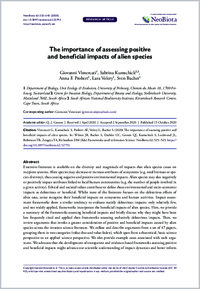The importance of assessing positive and beneficial impacts of alien species
- Vimercati, Giovanni Department of Biology, Unit Ecology & Evolution, University of Fribourg, Chemin du Musée 10, 1700 Fribourg, Switzerland
- Kumschick, Sabrina Centre for Invasion Biology, Department of Botany and Zoology, Stellenbosch University, Matieland 7602, South Africa - South African National Biodiversity Institute, Kirstenbosch Research Centre, Cape Town, South Africa
- Probert, Anna F. Department of Biology, Unit Ecology & Evolution, University of Fribourg, Chemin du Musée 10, 1700 Fribourg, Switzerland
- Volery, Lara Department of Biology, Unit Ecology & Evolution, University of Fribourg, Chemin du Musée 10, 1700 Fribourg, Switzerland
- Bacher, Sven Department of Biology, Unit Ecology & Evolution, University of Fribourg, Chemin du Musée 10, 1700 Fribourg, Switzerland
-
15.10.2020
Published in:
- NeoBiota. - 2020, vol. 62, p. 525–545
English
Extensive literature is available on the diversity and magnitude of impacts that alien species cause on recipient systems. Alien species may decrease or increase attributes of ecosystems (e.g. total biomass or species diversity), thus causing negative and positive environmental impacts. Alien species may also negatively or positively impact attributes linked to local human communities (e.g. the number of people involved in a given activity). Ethical and societal values contribute to define these environmental and socio-economic impacts as deleterious or beneficial. Whilst most of the literature focuses on the deleterious effects of alien taxa, some recognise their beneficial impacts on ecosystems and human activities. Impact assessment frameworks show a similar tendency to evaluate mainly deleterious impacts: only relatively few, and not widely applied, frameworks incorporate the beneficial impacts of alien species. Here, we provide a summary of the frameworks assessing beneficial impacts and briefly discuss why they might have been less frequently cited and applied than frameworks assessing exclusively deleterious impacts. Then, we review arguments that invoke a greater consideration of positive and beneficial impacts caused by alien species across the invasion science literature. We collate and describe arguments from a set of 47 papers, grouping them in two categories (value- free and value-laden), which span from a theoretical, basic science perspective to an applied science perspective. We also provide example cases associated with each argument. We advocate that the development of transparent and evidence-based frameworks assessing positive and beneficial impacts might advance our scientific understanding of impact dynamics and better inform management and prioritisation decisions. We also advise that this development should be achieved by recognising the underlying ethical and societal values of the frameworks and their intrinsic limitations. The evaluation of positive and beneficial impacts through impact assessment frameworks should not be seen as an attempt to outweigh or to discount deleterious impacts of alien taxa but rather as an opportunity to provide additional information for scientists, managers and policymakers.
- Faculty
- Faculté des sciences et de médecine
- Department
- Département de Biologie
- Language
-
- English
- Classification
- Biological sciences
- License
-
License undefined
- Identifiers
-
- RERO DOC 329712
- DOI 10.3897/neobiota.62.52793
- Persistent URL
- https://folia.unifr.ch/unifr/documents/308940
Statistics
Document views: 1093
File downloads:
- pdf: 1405
